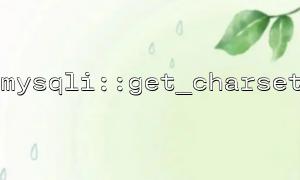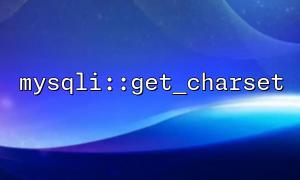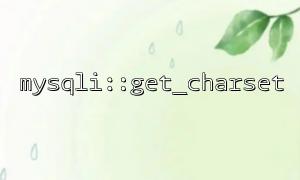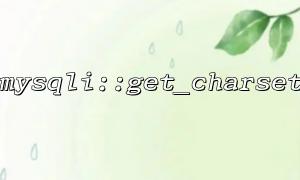When developing PHP applications, character encoding settings of databases are a very important aspect. Correct character encoding settings can ensure accurate storage and correct display of data. In MySQL, character set selection often affects the behavior when querying, inserting, and updating data. If the character encoding of the database connection is incorrect, it may cause garbled code problems and even affect the stability of the application. To check and set the correct character encoding, PHP provides the mysqli::get_charset method to get the currently connected character set.
mysqli::get_charset is a method provided by PHP's MySQLi extension, which is used to obtain the character set information of the current database connection. Through this method, we can determine whether the character encoding settings of the database connection meet expectations and make corresponding adjustments.
public mysqli_result mysqli::get_charset ( void )
On success, a mysqli_charset object containing character set information is returned.
Returns false when failed.
This function returns a mysqli_charset object, through which we can obtain the name of the character set and other related information.
In order to correctly set and verify character encoding, the following steps can be achieved:
We first need to establish a database connection, and then call mysqli::get_charset to get the character set of the current connection.
<?php
// create MySQLi Database connection
$mysqli = new mysqli("localhost", "user", "password", "database_name");
// Check if the connection is successful
if ($mysqli->connect_error) {
die("Connection failed: " . $mysqli->connect_error);
}
// Get the character set of the currently connected
$charset = $mysqli->get_charset();
// Output character set information
echo "The current character set is: " . $charset->charset;
?>
You can determine whether the character encoding of the database connection is correct by outputting the obtained character set name. If you want the database to be encoded with UTF-8, you can compare whether the return value is utf8 or utf8mb4 .
<?php
if ($charset->charset === 'utf8' || $charset->charset === 'utf8mb4') {
echo "Correct character set settings,Used UTF-8 coding。";
} else {
echo "Character set is incorrect,The current character set is: " . $charset->charset;
}
?>
If you find that the character set used by the database connection is not what you want, you can use the mysqli::set_charset method to change the character set of the connection.
<?php
// Set the character set to UTF-8
if (!$mysqli->set_charset("utf8")) {
echo "Character set setting failed: " . $mysqli->error;
} else {
echo "The character set has been successfully set to UTF-8。";
}
?>
This line of code will try to set the character set of the current database connection to UTF-8. If the setting is successful, you will see a prompt message; if it fails, the error message will be output.
When handling database connections, make sure that the character set settings are uniform. That is, when connecting to the database, the character set should be specified, and subsequent queries should also ensure that the correct character set is used.
If the connection is using utf8mb4 , this means that full Unicode encoding is supported, including some special characters (such as emojis).
For most modern applications, it is recommended to use the utf8mb4 character set, which supports a variety of languages and characters better than utf8 .
mysqli::get_charset is a very useful function that helps developers check the character encoding settings of database connections. Through this method, we can ensure that the database connection uses the correct character set, thereby avoiding garbled problems. If the connected character set is not set correctly, you can adjust it through the mysqli::set_charset method.
Maintaining the consistency of database character sets is an important step in developing high-quality applications. If you encounter a problem with character set settings, you can refer to the sample code in this article to troubleshoot and fix it.
Related Tags:
mysqli














